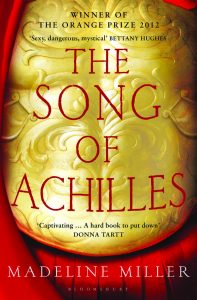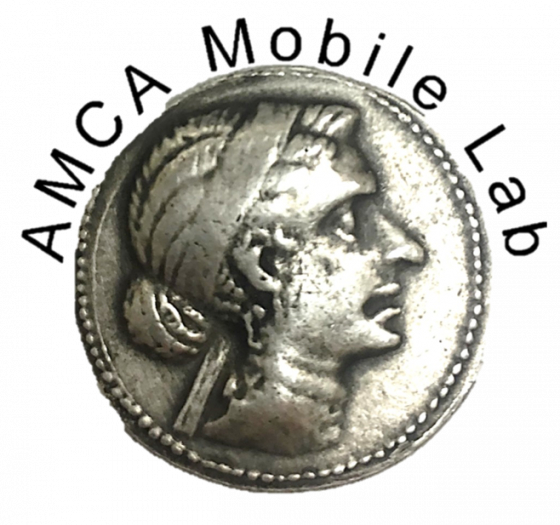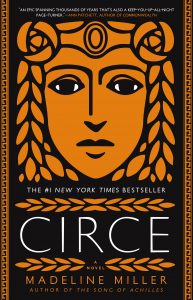Join BU classics scholar Emily Pell as she dives into a review of Madeline Miller’s Circe, a fresh retelling of Homer’s tale from the Odyssey. Also, for your enjoyment, we’ve included a brief snippet of BU classics scholar Lilly Hinckley’s exclusive interview with the novelist herself!

“Madeline Miller brilliantly offers a new perspective on the well-known mythological character Circe. Taking inspiration from the Odyssey, Miller incorporates familiar mythologies and stories from Greek mythology, including myths of Prometheus and Helios, but tells them from a new perspective. Miller also writes in the first person, giving a stronger voice to Circe and enabling her to look into the emotions and thoughts of the sorceress.
Miller writes chronologically beginning with Circe’s early life. Circe was the least favorite child of Perse, a naiad, and the Sun god and Titan, Helios. Her early childhood, as a minor unfavored immortal, was brutal and degrading as she was constantly bullied for her horrible sounding voice, which is later described as the voice of a mortal. Circe witnesses the punishment of Prometheus and grows somewhat close to him, learning about mortals and why he chose to defy Zeus to their benefit. Circe’s childhood presents her as relatively naïve, curious, and disliked by her family. Circe falls in love with a moral who she turns into a god, but is then exiled to the island Aiaia. She turns the nymph Scylla into the famous sea monster that plagues sailors after Circe’s beloved mortal turned god leaves her for the nymph. Throughout her adventurous story, Miller expertly depicts Circe’s emotions. How she feels, the betrayal that leads her to turn the nymph into a sea monster, her fear of Odysseus’ men and turning them into pigs, and her timid approach to accepting new lovers. Circe grows out of her naïve, childish character into a strong and fearful woman, yet Miller, in looking into Circe’s mind, shows her careful approach to growing close to others.
In the original mythology of Circe and other stories she takes a small part in, Circe is often depicted as a villainous dark witch, but with Miller’s new perspective and careful consideration of her early life, she is presented as a protagonist the reader can sympathize with. Throughout the story the reader grows attached to her as a character and Miller creates compelling emotions which the reader can connect directly to Circe.
Circe brings a fresh new look at familiar mythologies. Miller maintains the mythological stories, the main characters, their interactions, and significant components of the myths, while changing the perspective and anticipating the thoughts behind each decision or action taken by Circe. Whether the reader is familiar with original mythologies or not, Circe is an interesting, fun, and moving story that is entertaining while simultaneously providing insights to the religious and mythological stories.”
Keep reading to learn more about Miller’s journey, writing style, and classical background. For the full interview, please see the Spring 2020 edition of Butler University’s undergraduate literary magazine, Manuscripts.
Hinckley: It seems to me that classics as a field is shrinking every year. Do you have anything to say on the importance or relevance of classics in the world today?
Miller: I think it’s totally relevant. Culture has changed and technology has changed but people have not changed. Read any ancient text and you will see humanity in all its pride and folly and virtue. People will sometimes ask me, “How do you make these myths feel relevant?” But I feel that I don’t have to change anything, just allow what’s already there to bloom. Or maybe it’s more like pulling off the veil – the veil of time. Women have struggled with being belittled and undermined and abused for millennia. Circe in the Odyssey is presented as a figure of anxiety about female power. She has the power to strip men of their selfhood. We still fear women’s power. We still like to “tame” them as Odysseus tames Circe in the Odyssey. One of the really exciting things about being a classics teacher is having students come on the first day, thinking “this is going to be boring,” and realizing that these stories are anything but boring—they are vital and resonant. One of the most startling experiences of my life was reading the Philoctetes and then going to visit my grandmother who had broken her hip and couldn’t get around. She was so frustrated by the limitations of her body and by the fact that she couldn’t do what she wanted to do, and she felt abandoned by some of her friends. That’s what Philoctetes is about. It’s all there.

Hinckley: It’s still there. Yeah, that’s awesome! This next question goes along with that. In many of your interviews and in your presentation last night, you mentioned how Greek myths have a sort of timeless universality in what they tell us about humanity- and that’s something we would very much like to believe- but, clearly, there are flaws and missing perspectives in authors like Homer and Ovid. So, how do you grapple with that? And in your perspective, does that lessen the value of those works at all?
Miller: I think it’s important to be really honest about it. I definitely don’t want to sugar-coat the fact that Briseis is being kept as a sex slave. There have been so many adaptations that take a romantic view, where Briseis falls in love with Achilles. But that’s a very disturbing interpretation. So I think we have to be willing to confront the things that are disturbing in the literature. It’s important to keep engaging with it honestly. And it’s extra important because these works are the foundation for so many later works of literature, from James Joyce to the Penelopiad to Shakespeare. It’s okay to be ambivalent about them, to love them and still be frustrated with them.
Hinckley: Oh yeah, definitely. Recently, Emily Wilson came out with a new translation of the Odyssey. Do you see any similarities between your work and hers? And, as a follow-up question: do you see yourself as a feminist and did you intend for Circe to be a piece of feminine literature?
Miller: I think that she and I are both looking at these works and trying to find the silenced voices, and other perspectives. I love that she names the Cyclops chapter, “The Shepherd and the Pirate”- meaning Odysseus the pirate and the Cyclops, the shepherd. She’s also looking at how we “otherize” people. Odysseus feels entitled to come in and loot the Cyclops’ land, and because he’s telling the story we go along with that view of the cyclops as villainous. But Odysseus is the one invading his land.
Emily Wilson and I are also both interested in the women that Odysseus orders to be killed at the end. For generations, they’ve been translated as “the maids.” The word in Greek “slave,” and using that word, “slave,” as Emily Wilson does, reminds us that this is a slave society—that Odysseus is a slave holder. And as much sympathy as we have for Penelope, she has it a lot better off than the slave women, who have no power at all. I think Emily Wilson is brilliantly attuned to all those things.
And yes, I call myself a feminist, and yes, definitely, I think Circe is a feminist work. To me that means that Circe is the center and subject of her own story, as opposed to being an object in Odysseus’ story. One of the ways Odysseus describes her is having this beautiful, ornate hair. And he presents it as if she’s all dressed up in her fanciest outfit with her fanciest hair, just waiting for him to show up. That’s clearly a straight male fantasy of how women spend their time. In restoring subject-hood to her, I asked myself: why would “Circe of the beautiful braids” have braided her hair? Well, she spends all her time in the woods, she’s digging up herbs, she’s hanging out with her lions- you’d definitely put up your hair. That’s what I mean when I say I like to write close to Homer. I like to take that detail and flip it so she’s the subject and she looks at him as the object and she assesses how attractive he is. I don’t know why, but there’s a lot of fear around people calling themselves “feminists.” I think that there’s all this anxiety that it means that you hate men, which is also what Circe has been accused of over the years. I’m one of these people who believe that feminism helps everyone. As a teacher, I see young men being pushed into roles that don’t fit them all the time. When we loosen up those strictures, everyone benefits.
(Thank you for reading! Again, for the full interview, please see the Spring 2020 edition of Butler University’s undergraduate literary magazine, Manuscripts.)

